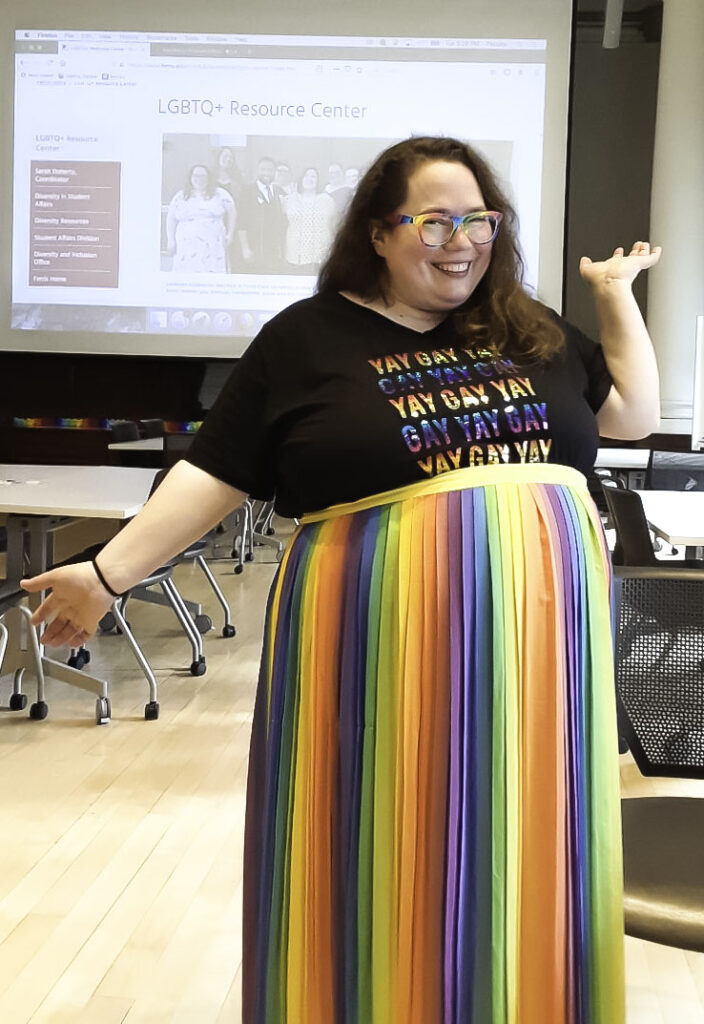
Currently, Sarah Doherty serves as the Ferris LGBTQ+ Resource Center coordinator, but for most of her adolescence her grasp of what queerness could be was faint and molded by the environment she grew up in. To get here, she’s devoted years to learning and listening.
Doherty was raised in Weston, Massachusetts, a wealthy suburb near Boston. When she was growing up, the town had problems of its own with homophobia and sexual harassment. Her parents tried to protect her from that, but in the process they also kept her from knowing valuable information about sex, sexuality, world diversity and social justice movements.
“I didn’t know that girls could be queer until I was fully 16 years old,” Doherty said. “I grew up in a family that valued keeping our business private over almost anything else. So talking about sex and sexuality was really taboo. Speaking up too much, just in general, was kind of frowned upon.”
Before discovering queerness for herself in a library book about two girls falling in love in the Boston area, queerness for her was primarily characterized by its portrayal in the media and homophobic jokes told by her peers.
When Doherty was a senior in high school she started a Gay Straight Alliance. GSAs are often present in middle schools and highschools. These groups are both organized and led by students, and they serve as safe spaces for LGBTQIA+ youth to discuss issues and establish a community.
“[After I started a GSA], I started going up at school assemblies to make announcements that it was happening at all, to raise the visibility and to also make people hear the word gay in a context other than Richard Gere jokes,” Doherty said. “[I] connected with other people. There was certainly pushback and people who weren’t allowed to hang out with me anymore, people who weren’t allowed to talk to me in school, some catcalling, some of your standard high school posters being ripped down and slurs written on stuff.”
Coming from a town that sees issues such as sexuality and diversity as taboo, Doherty has had to teach herself about the parts of the world that were not found in Weston.
She read books about activists who challenged corporations and societal expectations, she read the writings of LGBTQIA+ people of color, news groups and visited chat rooms that housed discussions and threads written by queer and trans adults. She also learned about the privilege she had as a white person from a wealthy town who had access to well-funded public education.
“I took out every book and every movie that the public library in my town had to offer. The librarians knew that I was queer before I actually figured out that I was queer. I did all the research,” Doherty said.
This learning continued when Doherty attended Cornell University as an undergrad. She lived in a multicultural living learning unit with other queer and trans people of color, in addition to cisgender and heterosexual people of color and a few other white students.
“We did regular share outs about our different cultures and heritages and [we spoke about] where we came from and what we were proud of. [We shared] what we had questions about and the histories of our ancestors,” Doherty said.
When she finished undergrad with a double bachelors in women’s studies and sociology, she worked at the LGBT Resource Center at Cornell for five years. Once she moved on from there she went to grad school, then she followed opportunities to organize with various communities and work with students.
The LGBTQ+ Resource Center job at Ferris opened up at a time when Doherty was actively looking for a chance to get back into the field that she loves.
Leading up to this point, Doherty’s work has focused on students. She contributes part of this trend to lived experience. She was a queer student who struggled with mental health issues and turbulent family relationships.
“My hope is that it’s useful to have access to the kinds of resources that I can set up and that I’m good at,” Doherty said.
Discovering her queerness has allowed Doherty to further understand her place in the world and to identify the things she doesn’t like about it. Ever since she picked up that book about the two queer girls in love, she has been educating herself and others to make it so that other kids don’t go years without exposure to sexuality, diversity and other issues that affect the people in this world.
